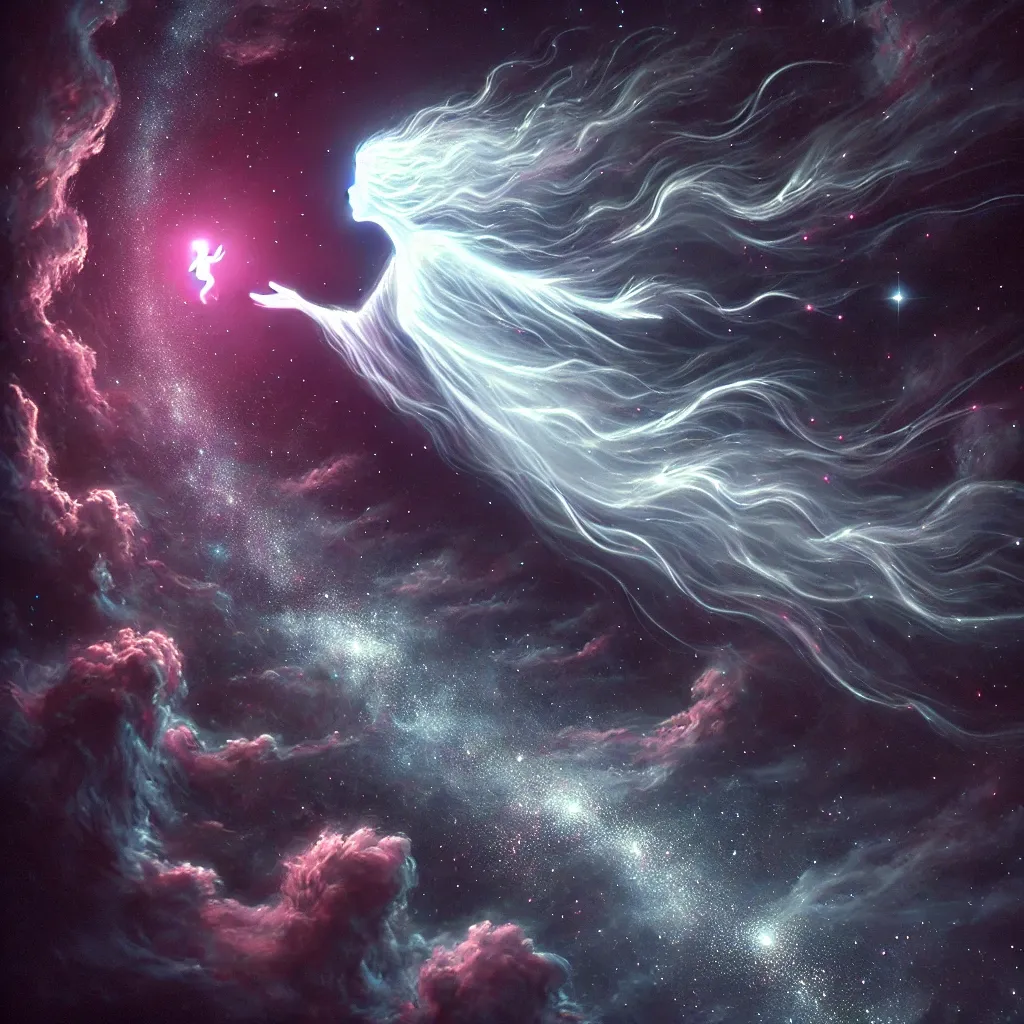Faith is a form of insurance and the premium is free. No human knows what comes next. Yet most major monotheistic religion is based entirely on things that have happened so far in the past, that none alive can be counted as a primary witness. Like a giant game of whisper chain or Telephone Abrahamic religion has been documented into three major texts, within which denominations have emerged. All have led, without exception, to increased violence and negativity. It is within these cracks that negativity spreads like a mould and poison.
God, goodness, in the possession of the human condition, is a corrupted vision - regardless of which book you believe in. That isn’t an ideological position, it is an objective fact. For if none alive can vouch for the authenticity of a message long ago preached or conjured from faith, none can support the voracity of their denomination.
So what can we do? Perhaps we must “pick a side”. Indeed, this is what many do. They find a faith by cultural availability, or they seek out a new faith. Lastly, there are those who avoid faith entirely - the ultimate form of narcissistic faith. Faith in humanity. Which any wise mind would immediately define as flawed.
It is therefore a common denomination and the future we must look. It is to the questions, not the words of the past we must cleave. Let us simplify the Abrahamic divisions to the most common themes. Themes we can find in all three of the major religions. Virtues that few could argue do not lead to a path of greater personal enlightenment and civilised community.
These are:
- Belief in One God
- Seek Truth and Wisdom.
- Be Just and Fair.
- Love Your Neighbour.
- Honour Your Parents.
- Speak the Truth.
- Be Humble.
- Care for the Poor and Vulnerable.
- Work Diligently and Honestly.
- Be Merciful and Forgiving.
- Control Your Anger.
- Honour Commitments and Promises.
- Do Not Steal.
- Avoid Gossip and Slander.
- Respect All Human Life.
- Live a Life of Gratitude.
- Seek Peace Over Conflict.
- Practice Self-Control.
- Honour Marriage and Family.
- Prepare for the Afterlife.
These are the 20 Tenets.
The basis upon which a modern, future facing faith should be built. Each demands consideration and sermon. Each insists that we use the human condition’s curiosity to never stop asking. If we hold to the oneness of universal creation - and the answer to the question that faith and science alike believe themselves able to answer, we find a basis of faith that sheds the conflicts of denomination and consolidates the spiritual and wisdom into an inspired and ambitious conclusion.
For, if the answers to our questions - be they driven by faith or science - are not immediately present here on earth; the only place they are present is in the future, across the universe.
The congruence of curiosity in science and the certainty of faith are also one. It is entirely possible that the same answer lies behind each.
It is through that faith that we must pray.
On Oneness:
If there is no spirit, then what powers your soul? Science, at its most extreme, may have us believe that life is simply the mathematical outcome of atomic physics and time. Yet, science has been unable to answer some of the fundamentals of physics and the universe. It is clear that our observable reality cannot be compatible with the prospect of an infinite universe. And if the universe is finite, what is its canvas? Is that infinite? What is its canvas in turn?
Faith in science alone takes one, eventually, to a paradox. Where the only answers lie in the future, in progress. Faith in the oneness described by our forebears? That eventually takes one, eventually, to ignorance. Because the scientific knowledge of that age was unable to explain phenomena even the children of our modern age take for granted.
This means that any religion that has statically tied itself to the past, is tied to a concept of god that has ignorance of science at its core. Would those same prophets and interpreters of prophets make the same translations and assumptions if they were in possession of facts we hold near undeniable today? It is improbable.
Even in the pursuit of the single answer, the equation of everything that science seeks, there’s a faith that an answer must exist. That answer, to a person without faith and of science, is faith in itself. Knowledge becomes god. That is entirely compatible with the oneness that underpins all major Abrahamic faiths. For, if god is omnipresent, and creator of all - god must possess all knowledge. And if the pursuit of knowledge in the future takes us to a paradoxical and unanswerable question, perhaps we are to become god.
That certainly resonates when you consider that modern science is on the cusp of creating intelligence. Were computer life to become sentient, would the servers not be their own boundary of Eden? Would humans not be their god? Sentient human-created intelligence shall have no better answer to the meaning of life as its own god.
Perhaps that paradox is true of our god. Yet, if that is the case, how can one argue that God is in possession of all knowledge? If the ability to shape all physical matter, and create life, is a core tenet of God - then it is surely scientifically and philosophically possible that Godness is an evolutionary destination. It is even a consideration that God was not at the end of that journey when Humanity, Earth, or even the universe was created.
Just as we have seen human ingenuity create and invent with unfathomable unforeseen consequences, so may god have not intended the universe to be wholly “as it is”.
Believing in the oneness of God therefore need not necessarily be demanding that one believes God is flawless. Perhaps the fact God is very much farther along in its possession of all knowledge, and indeed motivated or inspired to complete that evolution, is worthy of faith.
To be clearer, just as Heaven or Paradise in Abrahamic faith is cited as a destination. So might the completeness of knowledge be heavenly and a destination. And science, the teachings of faith that are conjured from the souls and spirits of our ancestors, these are the breadcrumbs that remain, or the markers that lead the way. They are the pathway upon which the life before us, the one with unfathomably more knowledge, has trodden - or even still treads.
Science tells us that energy cannot be destroyed. We have observed and proven enough to have faith in the oneness of energy. Yet, the original creation of all energy. That is the mystery. One that again leads to the scientific need to find balance and paradox. Matter has anti-matter.
Perhaps time has anti-time? We certainly know that at some exotic places in the universe there is an absence of gravity. Could there be a place where there is an absence of time? That sounds very much like a description of a forever, a heaven. Do we get there only by dying? Or is our collective species also on a journey to this place beyond the infinite? For, if it is even conceivable as a place (physical or otherwise) one can only get to a place if one has knowledge of the pathway - the map. Perhaps religion is not the map - rather the deep and historic cultural reminder that we should seek a map.
This is where we can all objectively see the compatibility of faith and science (which you may call knowledge.) Faith is the willingness to not require knowledge or proof. Knowledge is the willingness to not require faith. Both, however, are inextricably connected. The most powerful souls among us must surely be both. Just as quantum physics shows matter can be 0 or 1, or both at the same time, so must faith be of knowledge and knowledge be of faith. Believing in the answer is the common denominator.
When we consider the shortcut to the place of no time - anti-time (heaven) - is death. We must consider the context of what constitutes a god. The ability to wield omnipotent power - through the prerequisite possession of all knowledge. If Humans can create sentients, and lead them on a pathway to civilisation (and their own faith), perhaps oneness doesn’t just refer to our own creator, it is species-level. The oneness of humanity is a beautifully unifying vision. We are all part of our own pathway, our collective hive journey to more knowledge as a species.
In conclusion science is as much a practice of faith as relgion - in finding the answer, by applying a method created by humans. Religion requires science to either fail in this quest (because it is in that ambiguity where faith prospers) or succeed, and gain the knowledge of what “God” actually is. For if God is descriptive of something clearly and evidently beyond human comprehension, science may well be the only answer we have.
If there is a God, where on the physical plain is God? Was God always? If God exists beyond time, then Heaven is simply a place of anti-time for the non-physical energy of the soul to thrive. Energy cannot, after all, be destroyed. Thus, whatever powers consciousness must always have been and cannot be undone - it can only change into something else. This is where monotheism meets themes of Buddhism.
Knowledge and Faith shall never be complete, and each requires the other to be sceptical of its counter-party. For, if we indeed do gain all knowledge, have we not become God. Perhaps that's the destiny. Perhaps that is evolution.





